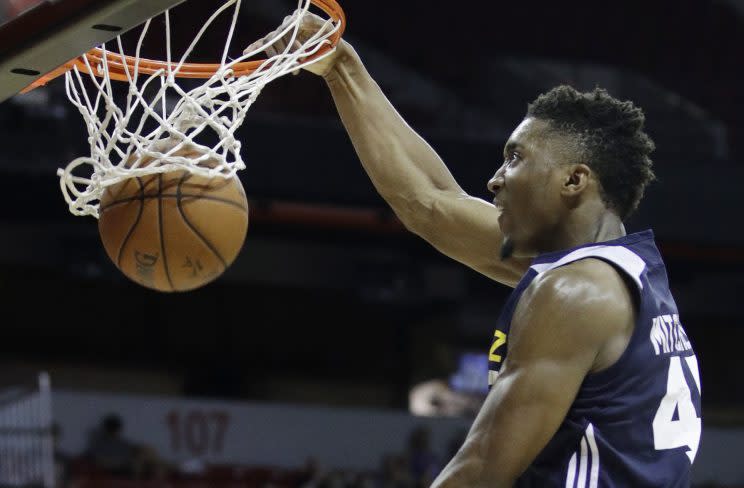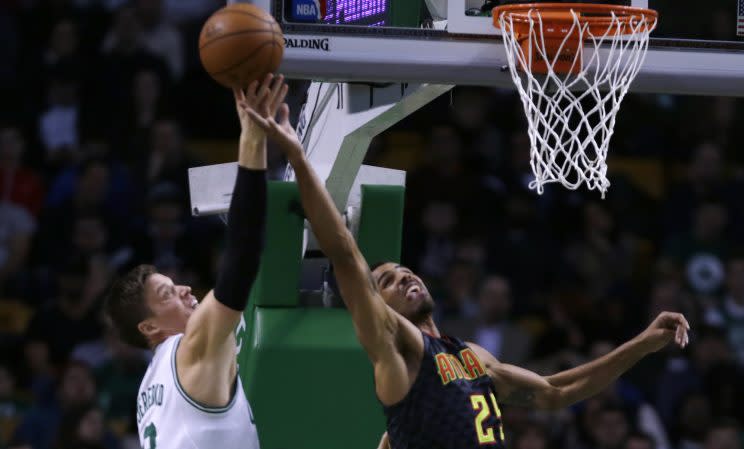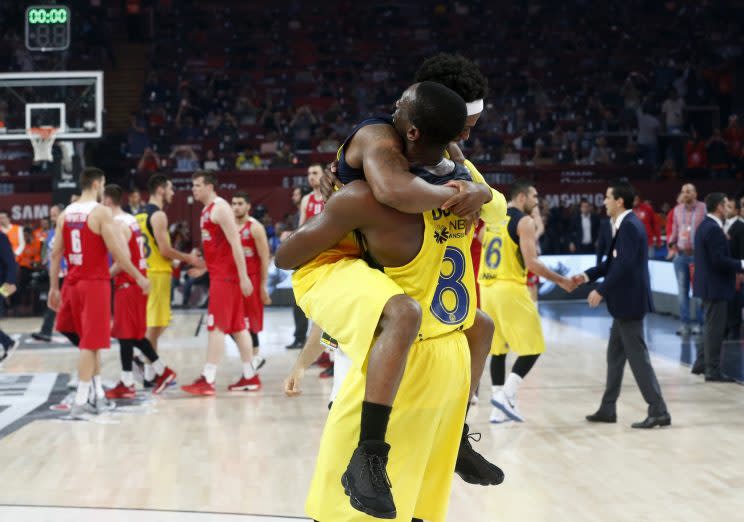Don't sleep on the retooled, Gordon Hayward-less Utah Jazz

The Utah Jazz lost Gordon Hayward, and that left a sour taste in the mouths of Rudy Gobert and a host of others in Salt Lake City, but GM Dennis Lindsey sure is squeezing those lemons for all their worth.
The Jazz managed to save a few million dollars by trading for Minnesota Timberwolves wunderkind Ricky Rubio and letting two-way contributor George Hill walk for more money from the Sacramento Kings, but they were still cap-strapped in a city that already struggles to lure substantial free agents.
So, when Hayward announced he was leaving Utah to join the Boston Celtics three days into free agency, when a number of potential replacements had already come off the board, the Jazz seemed destined to take a significant step back in a Western Conference that was getting deeper by the hour. After all, they lost two starters from a lineup that outscored opponents by 12.8 points per 100 possessions, even if they only played 21 games together, and Hayward was their lone 2017 All-Star.
But what if they’re no worse without Hayward? Hear me out.
[Follow Ball Don’t Lie on social media: Twitter | Instagram | Facebook | Tumblr]
After injuries cut short three of his first four NBA seasons, Rubio has been relatively healthy the past two years, and however you feel about adding the poor-shooting Spaniard at the point, another 75-plus games from him would be better than the hobbled half-season the Jazz got from Hill in 2016-17. Hill and Hayward combined for 7.7 assists per game last season — 1.4 fewer than Rubio generated.
Utah should also expect more from Dante Exum in his second season back from ACL surgery. So, even after Shelvin Mack left for the Orlando Magic, there’s a real hope Utah’s point guards could be better.
On the wing, the loss of Hayward is a blow, no doubt, but Lindsey did well to use what little cap flexibility he had to add forwards Thabo Sefolosha and Jonas Jerebko for a combined $7.3 million next season. Let’s not pretend either will be close to the playmaker Hayward was in Utah, but Sefolosha can fill some of the void left on defense, and Jerebko was an energetic two-way contributor in Boston. Together, they add depth and flexibility behind crafty veteran Joe Johnson at the forward position.

Making up Hayward’s 22 points per game is a bigger problem, but coach Quin Snyder will surely put some of that onus on his shooting guards. Rodney Hood’s efficiency might further benefit from more than 11 shots a night, and he is entering his fourth season in Utah — the same year Hayward made his leap from reserve contributor to legitimate NBA scorer. Hill and Hayward were Utah’s best ball-handlers in the pick-and-roll last season, but the drop-off to Hood wasn’t so significant that the Jazz should lose hope that he can match their one-point-per-possession output if given the opportunities.
Additionally, rookie two-guard Donovan Mitchell, whom Lindsey acquired by moving up to the 13th pick in exchange for once-promising forward Trey Lyles and the No. 24 pick, has been one of the biggest surprises of the summer, amassing a Las Vegas league-high 37 points, 16 free throws and eight steals earlier this week. He could well be the steal of the draft after two solid seasons under Rick Pitino.
The Jazz haven’t yet written off Alec Burks, either. A rising two-way guard in 2014, Burks has endured three straight brutal seasons worth of injuries, but we’re still only 18 months away from Dwyane Wade calling him the NBA’s most underrated player, and he might finally be ready to fill his old role off the bench after returning for the second half of last season. Joe Ingles’ contract is pricey , but he is still Hayward Lite in terms of impacting the game in all aspects. If nothing else, Snyder has options.
As for bigs, Utah still features arguably the league’s top center in Rudy Gobert, who has improved every season and solidified himself as a devastating rim runner and protector on both ends. He could have easily warranted First-Team All-NBA honors over Anthony Davis in 2016-17, and he finished second to Golden State Warriors forward Draymond Green in Defensive Player of the Year voting. There is no reason to believe he won’t be as good, or even better, manning the middle in 2017-18.
The Jazz waived Boris Diaw’s non-guaranteed contract by the July 15 deadline following his underwhelming first season in Utah. That likely means more minutes again for 25-year-old Derrick Favors, who averaged 16 points and eight rebounds for two straight seasons before giving way to floor-stretching forwards during Utah’s 51-win campaign last season.

Finally, the Jazz added former sixth overall pick Ekpe Udoh on short money (two years, $6.5 million). The 30-year-old fell out NBA favor after stops with the Golden State Warriors, Milwaukee Bucks and Los Angeles Clippers, but found success the past two seasons, averaging 14.3 points (57.4 field-goal percentage), 7.9 rebounds, 2.4 assists and 2.3 blocks for reigning Euroleague champion Fenerbahce.
So, out go Hill, Hayward, Lyles, Mack and Diaw, and in step Rubio, Sefolosha, Jerebko, Mitchell and Udoh. Just for fun, let’s compare those quintets’ combined 206-17 averages …
• Hayward, Hill, Diaw, Mack and Lyles: 57.4 points (55.7 true shooting percentage), 16.6 rebounds, 13.8 assists (against 7.3 turnovers) and 4.4 combined blocks.
• Rubio, Sefolosha, Jerebko, Mitchell and Udoh: 48.8 points (55.1 true shooting percentage), 23.8 rebounds, 16.7 assists (against 6.8 turnovers) and 9.8 combined blocks/steals.
Sure, Mitchell and Udoh did their work outside the NBA in 2016-17, but I bet you didn’t figure those numbers would be so comparable. And if even only a few members of Utah’s 26-and-under crowd — Gobert, Rubio, Hood, Favors, Burks, Exum and Mitchell — make improvements, the gaps begin to fill.
Let’s not pretend it’s all roses from here on out. Rubio’s shooting is an issue. His defenders will sag under pick-and-rolls, leaving less room for Gobert to work, and playing Favors with those two makes for a bygone offense. Sefolosha creates similar spacing issues, unless he finds the stroke he lost since two elite shooting seasons in Oklahoma City from 2011-13. Joes Ingles and Johnson can stretch the floor, and the hope is that Hood, Burks, Jerebko and Mitchell will help in that regard, too. Still, Rubio, Hood and Johnson will have their hands full replacing the shot creation void left by Hill and Hayward.
Still, Snyder can roll out plus defenders at every position, with Gobert and Udoh terrifying opponents on the back end. The additions of Mitchell, Sefolosha and Jerebko to a versatile corps that already features Hood, Ingles and Johnson allow the Jazz to match every possible lineup combination. It would not be surprising to see a team that owned the third-best defensive rating in 2016-17 (102.7) improve to a league-best standard this year. In which case, it can afford a step back offensively.
So, those upstart Jazz who reached the Western Conference semifinals remain a young roster on the rise, even without Hayward and Hill, and what they lost in talent, they can try to make it up with depth and development. They may be sour, but Lindsey is still selling lemonade along the Great Salt Lake.
– – – – – – –
Ben Rohrbach is a contributor for Ball Don’t Lie and Shutdown Corner on Yahoo Sports. Have a tip? Email him at rohrbach_ben@yahoo.com or follow him on Twitter! Follow @brohrbach


